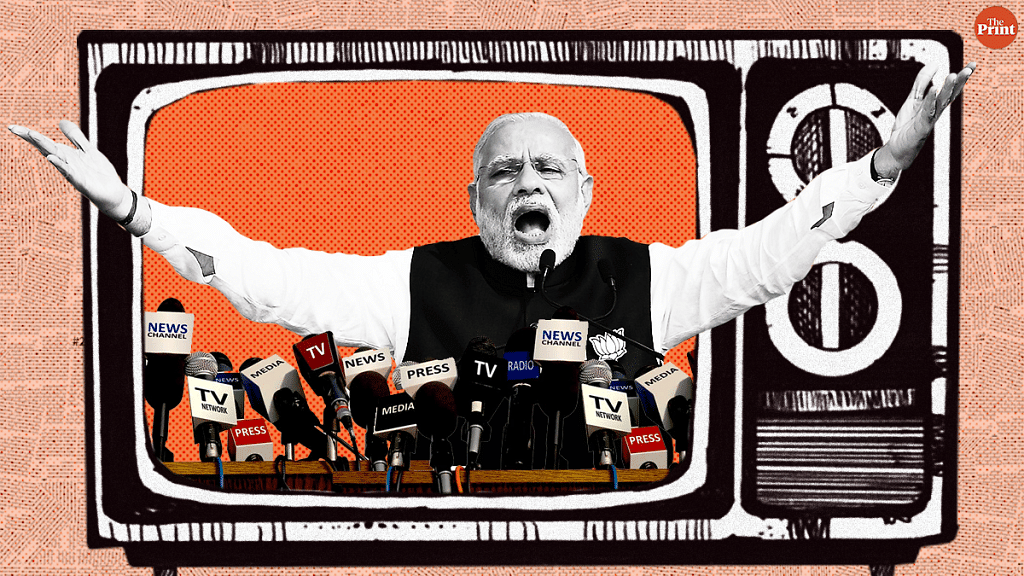We may know the winner in the 2019 Lok Sabha elections only on Thursday, but the sure-shot loser is already confirmed: the Media, the fourth pillar of democracy that was.
There is a reason Narendra Modi didn’t bother to take even one question at his first press meet in India in five years. The Prime Minister had all the time to recall in details how “satta bazaar” — that was predicting 150 for the Congress and around 218 for the BJP in 2014 elections — had lost billions when he came to power but he wouldn’t entertain any question from the press.
He just didn’t care. It was not only because he could communicate directly with the people but also because he knew the media is hugely discredited today — more than ever before.
Ask the political reporters who were out in towns and villages trying to get a sense of the public mood. One of them working for a leading English daily was in Sholapur in Maharashtra, chatting with one Sushil Gaekwad — as he identified himself. Gaekwad was singing paeans about Modi and Balakot air strikes when an acquaintance passed by addressing him as ‘Sandip’. Sensing puzzle on the reporter’s face, Sushil Gaekwad gave a sheepish grin and revealed his true identity — Sandip Bhosale. “You never know about visitors from Delhi,” he tried to explain. As the conversation with the reporter progressed, Sandip’s views about the Modi model of governance had changed.
Also read: Tamasha TV for a tamasha PM: How Indian media covered Modi this election
Another reporter with another English daily was in Patna, talking with a turbaned gentleman from Delhi’s Punjabi Bagh. He started by saying out that he had voted for Modi. Five minutes into the conversation, the gentleman was defending every single action and word of Aam Aadmi Party’s Arvind Kejriwal. Did he really vote for Modi? Only he knows.
A group of reporters stopped at a ‘lassi’ shop in Union minister Manoj Sinha’s Ghazipur constituency in Uttar Pradesh. The youngster at the shop, a Yadav, declared his allegiance to ‘Akhilesh bhaiyya’ and offered many reasons. As the reporters walked back towards the taxi, he came running — “Don’t take me wrong. My vote is actually for Modiji.” The journalists could take their pick.
There are scores of such anecdotes involving journalists who visited different parts of the country to cover elections. Puzzled and confused, they have come up with their own interpretations. Some call them “silent voters” who wouldn’t reveal their minds. Others see a “fear factor” that prevented the people from speaking out their voting preferences. And a few speak of how Indian voters have become “intelligent” and “sharp”.
Also read: Narendra Modi interview no exception. Indian media rarely asks PMs tough questions
The fact is that the media is losing the voters’ trust. It clearly has among large swathes of population who, likely taking cue from the leaders they follow, routinely target journalists on social media for even news reports. It was never easy for political reporters to gauge the mood of voters. But people used to be welcoming and open to them even if they refused to spell out their voting preferences. It’s different now. Political reporters are given to seeing conspiracies but they can’t explain why they are now greeted with unmistakable smirks, mocking tones and apparent distrust.
The media may have itself to blame for losing people’s faith and confidence, by often crawling when asked to bend by the powers that be. The political class may have a myriad differences today due to conflicting interests but they are united when it comes to discrediting the media. All of us saw the people laughing and cheering every time Modi, as a prime ministerial candidate in 2014, poked fun at the media in his election speeches.
Long before the ‘chowkidar’ Modi took over the country’s reins, Rahul Gandhi, then AICC general secretary and now Congress president, called journalists “thieves”. The opposition leader is full of sympathy for journalists today as he has discovered that they are “scared of speaking out” in the Modi regime and become “pliable” when they interview Modi.
As for the ruling dispensation, long before Donald Trump’s White House moved to deny accreditation to non-pliable journalists, Modi had shut down the media’s access to his office (PMO) and took adequate measures to make his administration leak-proof.
Also read: Dear PM Modi, you’re spending too much time on Twitter and have got the media wrong
In the past five years, the media has been under constant attack for allegedly being “partisan” and, ironically, it has come from both the ruling and the opposition leaders. The Prime Minister himself has led the charge and accused the media of being biased against him. “Are you a Congress spokesman or neutral media?” has been his usual refrain when confronted with a probing question. When Gen (retd) VK Singh triggered a controversy with his “presstitute” remark, Modi chose to praise his works and “salute” him.
The free press may not bother about the fact that the country’s most popular leader, his principal political challenger and every Tom, Dick and Harry in the political system today are going extra miles to try to discredit it. But the big crisis the media is confronted with now is its dwindling credibility among the people — from whom it derives its powers, legitimacy and independence.
